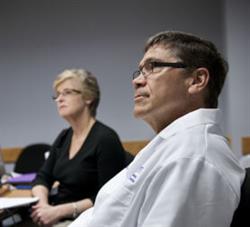HOW 4 POWERFUL GENERATIONS OF NURSES ARE CHANGING LIVES
By Lindsay Schaller
When 4 very different generations work together, the result can be uniquely impactful. For nurse educators and students, this diversity can fuel classes and cohorts that combine to offer a wider outlook with each person interacting and continually learning from one another.
Each generation can contribute to a culture that embodies strong communication and leadership, adaptable work styles, and meaningful values, as well as collaboration of thought. Ultimately, the differences between each age group will help every nurse, nurse educator, and nursing student to serve and understand the needs of clients.
How can you best take advantage of these differences? Consider each generation, its characteristics, and big life events. With that information, you'll be able to understand others' perspectives and contribute to a civil, healthy workplace for nurses and clients.
Baby Boomers
 Baby Boomers — those born between 1946 and 1964 — are currently the generation that has been in the workplace for the longest. This generation has primarily focused on outcomes, and its members have become known as “workaholics” based on their drive for personal success and career advancement.
Baby Boomers — those born between 1946 and 1964 — are currently the generation that has been in the workplace for the longest. This generation has primarily focused on outcomes, and its members have become known as “workaholics” based on their drive for personal success and career advancement.This generation's “workaholic” nature prioritized its performance first and its employers second.
Baby Boomers know a world without the Internet, which is likely why its preferred communication style is face-to-face. Its upbringing was shaped by world events such as the Civil Rights Movement, the end of the Vietnam War, the assassination of JFK, and the soaring popularity of the music group, the Beatles.
Generation X
 Generation X — also known as post-Boomers and Xers — was born between 1965 and 1976. The term Gen X was coined based on this generation's interest in pursing the concept of work/life balance, which has continued to be prioritized by other generations.
Generation X — also known as post-Boomers and Xers — was born between 1965 and 1976. The term Gen X was coined based on this generation's interest in pursing the concept of work/life balance, which has continued to be prioritized by other generations. Because the individuals in this group are between the traditional learning preferences of Baby Boomers and the technology-centered learning style of Millennials, they are highly capable of gleaning information from both styles.
They are characterized as being independent, pragmatic, and self-reliant — traits likely developed from their parents’ dedication to work, which created individuals readily able to take care of themselves.
Significant events during their upbringing include the Watergate scandal, the energy crisis, the fall of the Berlin Wall, the Apollo 11 moon landing, and the Iran hostage crisis.
Millennials
 Millennials — or Generation Y — is the group born between 1977 and 1997. This hopeful, fun-seeking, ambitious group is the first to come of age during the rapid growth of the Internet.
Millennials — or Generation Y — is the group born between 1977 and 1997. This hopeful, fun-seeking, ambitious group is the first to come of age during the rapid growth of the Internet. Currently occupying the largest portion of the workforce, they desire jobs that improve society and crave frequent learning and advancement opportunities. This group is unafraid of change, likely because its members grew up with evolving technology that constantly changed their lifestyles. They have become natural networkers who effortlessly navigate the world of technology and use it to make connections with peers.
World events that have been prominent during Millennials’ lives include the tragic attack of 9/11 and Operation Desert Storm.
Generation Z
Generation Z comprises people born after 1997 and is currently the youngest generation in the world and the nursing profession. Gen Z — also known as iGen or Digital Natives — is a group that has never known a world without technology. The tech savvy, creative group is one that thrives and is motivated by opportunities that allow it to make a difference in the world. (The nursing profession is a perfect fit for this group as it already provides the meaningful, socially responsible work they crave.)
 Members of Gen Z seek deeper social connections filled with honesty, transparency, and authenticity from friends, employers, leaders, and brands.
Members of Gen Z seek deeper social connections filled with honesty, transparency, and authenticity from friends, employers, leaders, and brands.
Given that Gen Z members are about age 22 and younger, their defining moments and adult characteristics are not yet concrete. However, they have grown up in a world with constant cultural and political change, where tolerance of others and all lifestyles, acceptance, and self-expression are of critical importance. They also saw the election of the first U.S. African-American President and the first woman to run for that office.
As each generation acclimates to the others, it is imperative for all in the nursing profession to embrace the change and the individuality that all bring. Each new generation offers a fresh perspective and unique ideas, while the generations with more experience can mentor, share their learning, and open doors for those entering.
Each generation brings its own strengths, distinct characteristics, and views of events that have shaped them as a whole. The nursing profession is fortunate to have a diverse and wide-ranging set of skills and attributes — from each generation — that help push it to continue embracing the changes that will drive healthcare toward a safe future for nurses and clients.
Share your thoughts about the differences among the generations now and soon to be working in the nursing profession. What are the benefits? Which generation have you learned the most from in your career?
To read more on this topic, check out these sources:
- Top 10 Gen Z Questions Answered
- Meet Generation Z: The Newest Member to the Workforce
- A Breakdown of the Five Generations of Employees in the Workplace
- 5 Generations in the Workforce
 Lindsay Schaller is a marketing and communications intern for Ascend Learning, the parent company of ATI Nursing Education. She currently attends Kansas State University (Manhattan, Kan.), where she is pursuing a marketing degree with minors in leadership studies and apparel and textile studies.
Lindsay Schaller is a marketing and communications intern for Ascend Learning, the parent company of ATI Nursing Education. She currently attends Kansas State University (Manhattan, Kan.), where she is pursuing a marketing degree with minors in leadership studies and apparel and textile studies.